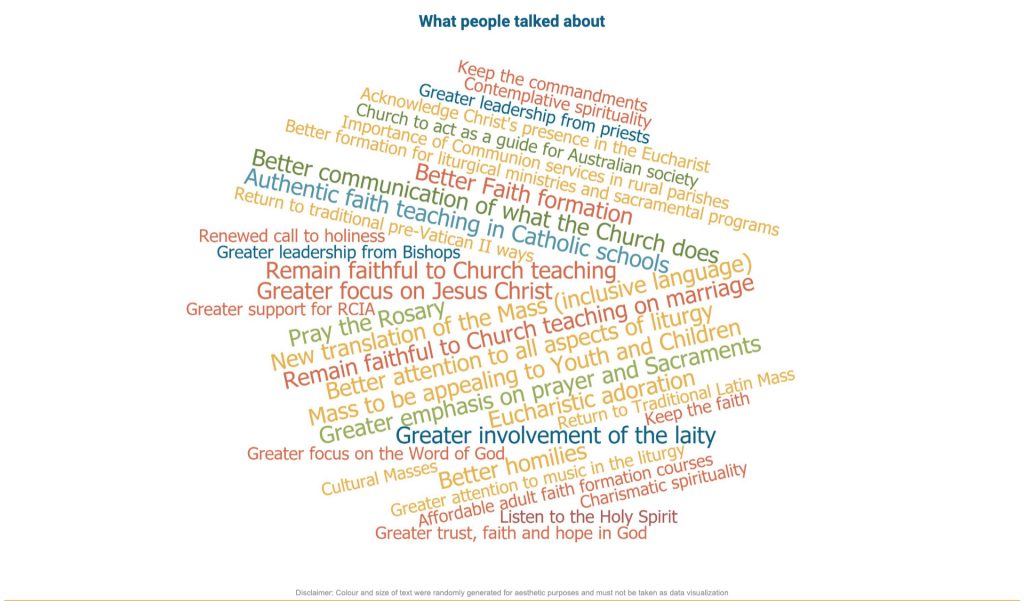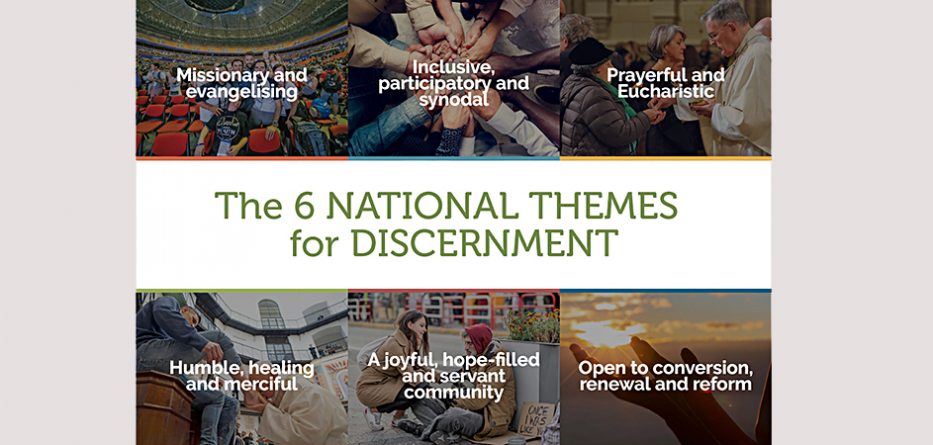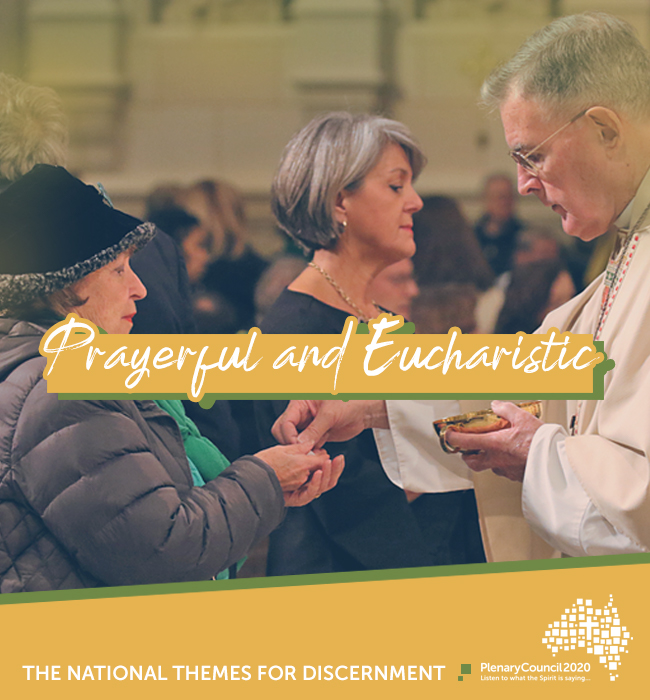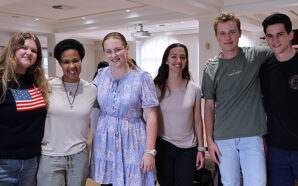SNAPSHOT REPORT: How is God calling us to be a Christ-centred Church that is:
Prayerful and Eucharistic
“When they were at table, Jesus took bread, said the blessing, broke it and gave it to them. Their eyes were opened and they recognized him.” (Luke 24:30-31)
As we move into this second stage of the Plenary Council journey, we continue to seek the wisdom of the Holy Spirit. Beginning in July 2019, we are invited to reflect on Scripture, Church teaching and our contemporary situation in order to discern the answer to this question: How is God calling us to be a Christ-centred Church that is prayerful and Eucharistic? The fruits of what is discerned during this time will help shape the agenda of the first session of Plenary Council in October 2020.
This National Theme for Discernment is inspired by the voices of the People of God who shared how deeply they treasured the Eucharist and the sacramental and liturgical life of the Church. There was a call for stronger and more engaging preaching, with an emphasis on the Word of God and connection to daily life, some seeking a uniquely Australian expression of prayer and Eucharistic celebration, drawing from the wisdom and rituals of the Aboriginal and Torres Strait Islander people and also bringing together the many migrant communities which make up the Church in Australia. There were many divergent expressions of ways in which people and communities encounter God through their experiences of prayer, music and liturgy, and a desire for catechesis, training and formation for those in ministries related to these.
Topics: what did people talk about?
People spoke about a number of different topics in PHASE 1: LISTENING & DIALOGUE. A comprehensive report on all the voices of participants will be released on July 28, 2019.
Below are some of the topics that informed this particular theme, which was created through a combination of analysis, discernment and prayer.
• Acknowledge Christ’s presence in the Eucharist • Affordable adult faith formation courses • Authentic faith teaching in Catholic schools • Better attention to all aspects of liturgy • Better communication of what the Church does • Better Faith formation • Better formation for liturgical ministries and sacramental programs • Better homilies • Charismatic spirituality • Church to act as a guide for Australian society • Contemplative spirituality • Cultural Masses • Eucharistic adoration • Greater attention to music in the liturgy • Greater emphasis on prayer and Sacraments • Greater focus on Jesus Christ • Greater focus on the Word of God • Greater involvement of the laity • Greater leadership from Bishops • Greater leadership from priests • Greater support for RCIA • Greater trust, faith and hope in God • Importance of Communion services in rural parishes • Keep the commandments • Keep the faith • Listen to the Holy Spirit • Mass to be appealing to youth and children • New translation of the Mass (inclusive language) • Pray the Rosary • Remain faithful to Church teaching • Remain faithful to Church teaching on marriage • Renewed call to holiness • Return to Traditional Latin Mass • Return to traditional pre-Vatican II ways
A SNAPSHOT OF RESPONSES TO THE QUESTION
What do you think God is asking of us in Australia at this time?
- “Eucharistic Adoration: For Churches to offer daily Holy Hours or, where possible, perpetual Eucharistic Adoration to grow deeper in faith”.
- “I think God is wanting us so-called Christians to get involved with learning more about our faith, to enable us to pass information onto the outside world; that is, hungry to know the truth. We can’t say we go to Mass and think that is all God expects of us”.
- “God is asking us not to give up on Catholic schools. I want Catholic education authorities to value the religious life of the Catholic school, not as a photo op or a 20-second sound bite, but as places that privilege the transmission of Catholic culture, where both tradition and contemporary life are valued”.
- “Pray more. To be more reverent at Mass. God wants us to obey God’s truth in the Bible, God wants us to obey the 10 Commandments. God wants us to say the Rosary. God wants us to love Him. God wants a personal relationship with Him”.
- “Firstly to be patient. Many improvements/revivals in the Catholic Church over the centuries came from new movements inspired by the Holy Spirit. Secondly, to listen. Much wrongdoing in our present society is very apparent if we revert to ‘first’ Christian principles. Thirdly, we need to act: The Church and its members are too institutionalised and divorced from what is happening in our own neighbourhoods. We are not doing or acting like Christ would have done and in fact what Christ is still today wanting us to do. I think Pope Francis is making a definite leap in this direction”.
A SNAPSHOT OF RESPONSES TO THE QUESTION
What questions do you have about the future of Australia that you would like the Plenary Council to consider?
- “What does it mean to live a true Christian life?”
- “How can we encourage all Catholics to be open to the Spirit working in people in different ways, through different forms of liturgy (traditional and charismatic), different types of worship and different faith responses to the Spirit in individuals and communities?”
- “How do we get people to return to prayer when we live in such a fast-paced life?”
- “Can lay-led liturgy be made to resemble the Mass more closely in regards to the prayers that are not part of lay-led liturgy but are part of the Mass?”
- “How do all the faithful called to prayer and a living relationship with Jesus Christ learn about their faith through the Sacraments, catechesis, ongoing education and following the traditions of the Church in a multicultural society which has become very secular?”
A SNAPSHOT OF
Your Stories of Faith
ALAN, 72 YEARS OLD, SYDNEY
As someone from a strong Catholic family, I had the benefit of a good Catholic upbringing and education. After school, I joined the local parish CYO where I met my future wife, who also had experienced a similar faith journey. Throughout our lives we have engaged in retreats, parish missions, family group activities and RCIA programs. These have helped to continue our faith experiences.
CELIA, 58 YEARS OLD, MELBOURNE
At the daily Mass I attend, the priest will give a short three- to five-minute homily directly relevant to the Gospel and which aims to teach the faithful some key component of living Christian life and challenge us to live the faith better. The best homilies get to the point quickly and are not afraid of speaking clearly about the demands and rigour of living Catholic faith to the full.
ANONYMOUS
I came close to God through crisis. In many ways I feel like the prodigal son. When my wife was diagnosed with cancer at [in her 20s] my understanding of my faith was changed forever. Two years into her journey, I had completely turned my back on God – why would a loving God allow my wife to die and be in so much pain? Why would he let her get cancer at precisely the time we were planning to have children? Why would my life be completely disrupted to become her carer – losing my job and moving away from friends and family? I did not understand God, or where He was in my life at all. But I did witness my wife completely surrender her life to Him. She knew she was going to die and that God would take her to Heaven when He was ready for her. Three-and-a-half years after the diagnosis, He did exactly that. And I then realised that God was helping me the whole time – He was working through me to care for her, to be God for her and to love her. I sacrificed everything to care for her, but God gave me the physical, emotional and mental strength to carry [my wife] through her difficult earthly pilgrimage.

DISCLAIMER: Colour and size of text were randomly generated for aesthetic purposes and must not be taken as data visualization. Image: Plenary Council 2020.
Please note this report contains only a snapshot of thousands of stories and responses shared. A comprehensive report on the voices of participants will be released on July 28, 2019.
READ: Snapshot Report 1 – Missionary and evangelising
READ: Snapshot Report 2 – Inclusive, participatory and synodal
More information on the National Themes for Discernment can be found on the Plenary Council website: www.plenarycouncil.catholic.org.au
With thanks to the Plenary Council.









